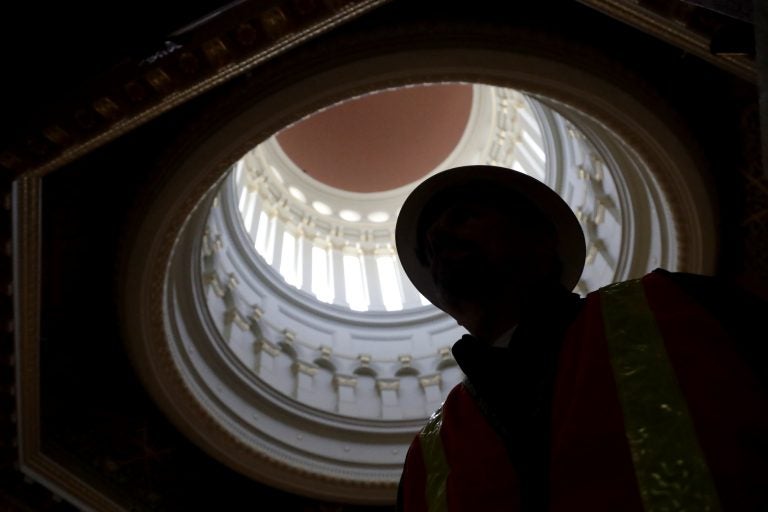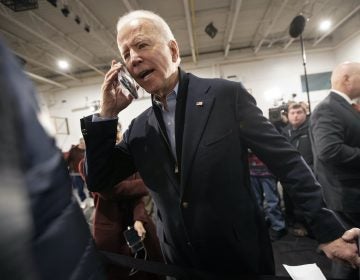Issue advocacy groups say N.J. ‘dark money’ bill unfairly targets their private donors
Democratic lawmakers in New Jersey are pushing a bill that would require “dark money” groups that support political candidates or causes to disclose their donors.

Contributors may fear blowback from employees or customers if their support for the organization became public, some nonprofits say. (Julio Cortez/AP Photo)
Democratic lawmakers in New Jersey are pushing a bill that would require “dark money” groups that support political candidates or causes to disclose their donors, an idea backed by election transparency advocates.
But smaller nonprofits that support controversial issues and promise confidentiality to their donors — and claim that politics is not their main focus — would also be required to publicize the sources of their contributions, which they say could dissuade financial supporters who prefer not to be identified.
“I believe it will have a chilling effect on some donors who want to keep their donations anonymous,” said Marie Tasy, executive director of New Jersey Right to Life, a Piscataway-based group that opposes abortion.
Contributors may fear blowback from employees or customers if their support for the organization became public, Tasy said. And others want to avoid being solicited for donations by other groups, she said.
“We work on what is sometimes a controversial issue,” said Kim Callinan, CEO of Compassion and Choices, which advocates laws guaranteeing access to medical aid for the dying.
“There is a minority of people who are very opposed to the legislation that we’re trying to pass. They can get hostile and confrontational, and harass and intimidate [supporters], and it’s not fair to put a donor through that,” she said.
The legislation would be retroactive and require organizations to disclose their donors back to Jan. 1, 2018. The idea of identifying contributors who may have been promised anonymity and donated before they were aware of this proposal is “unconscionable,” Callinan said.
First introduced in 2016, the legislation got renewed attention following an outcry over the announcement from the group New Direction New Jersey — which has ties to Democratic Gov. Phil Murphy — that it would not disclose its donors after promising that it would.
The proposal would require independent expenditure groups funding political activities, as well as social welfare groups classified by the IRS as 501(c)(4) organizations operating in New Jersey, to disclose who bankrolls them.
Some groups raise exorbitant sums to support or oppose candidates and influence policy, while the sources of their funding remain in the “dark.”
Under the legislation, organizations would have to disclose donors who contribute more than $10,000 in a given year.
“Each of us as candidates for office are legally required to disclose who contributes to our campaigns,” said state Sen. Troy Singleton, D-Burlington, at a Jan. 17 hearing of the Senate Budget and Appropriations Committee. “So should those who operate in the world of independent expenditure committees, who seek to influence those campaigns and public policy.”
While the measure would apply to organizations supporting political candidates or causes, it would also put the disclosure requirement on groups including New Jersey Right to Life and Compassion and Choices, as well as others such as Garden State Equality and the American Civil Liberties Union that say their main focus is not to influence public elections.
“We advocate for transparency, but we also advocate for privacy,” said Amol Sinha, executive director of the ACLU-NJ.
“In the advocating for transparency that we do, we attribute that to those public entities that are going to govern us. And that’s incredibly important,” Sinha said. “But when we are talking about disclosing individuals who give to organizations that are protected by the First Amendment, I think we’re talking about a different thing.”
Sinha told legislators that the bill could prompt lawsuits from organizations such as his opposing the disclosure requirement.
An amended version of the bill, which had already passed in the Senate Budget and Appropriations Committee, passed again Monday. An identical bill in the Assembly has not yet been acted on.
Murphy and state Senate President Steve Sweeney, D-Gloucester, have both expressed their support for additional transparency requirements.
WHYY is your source for fact-based, in-depth journalism and information. As a nonprofit organization, we rely on financial support from readers like you. Please give today.




